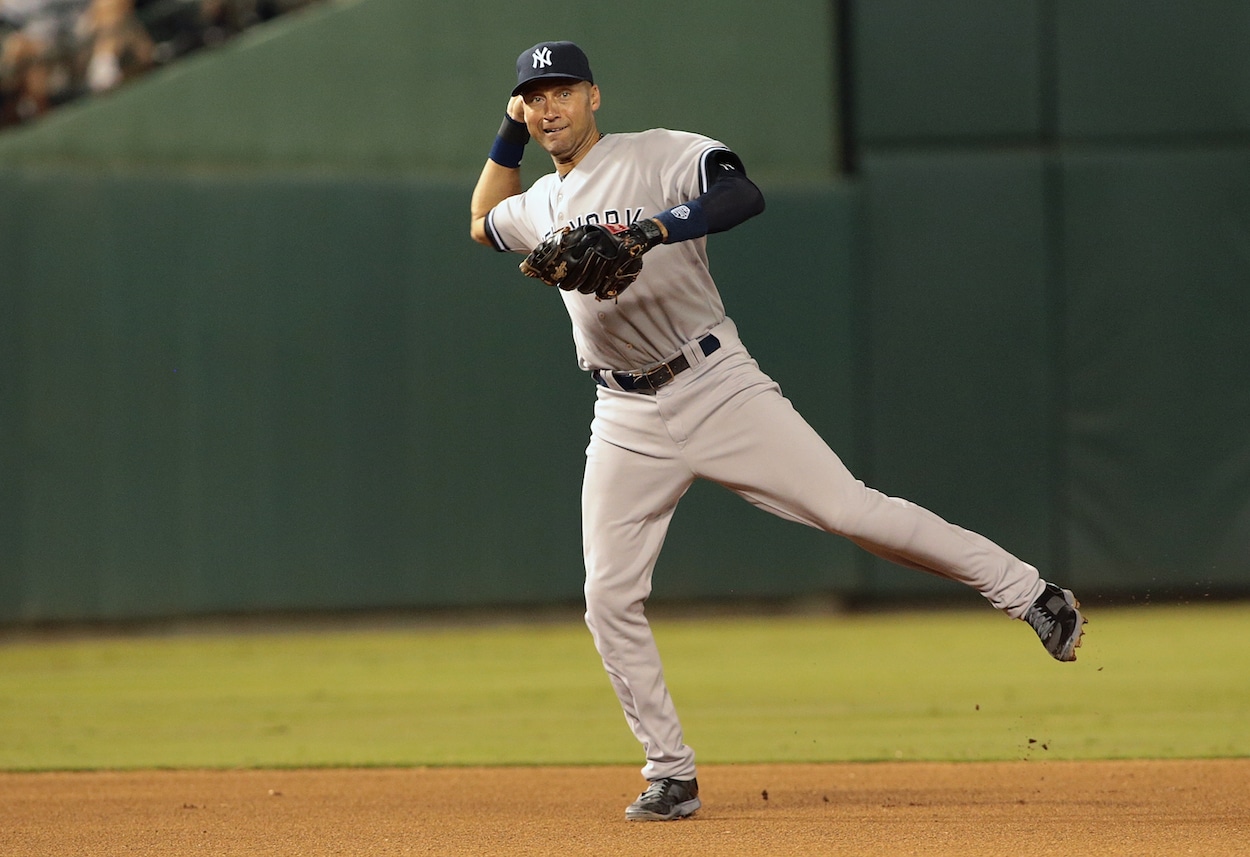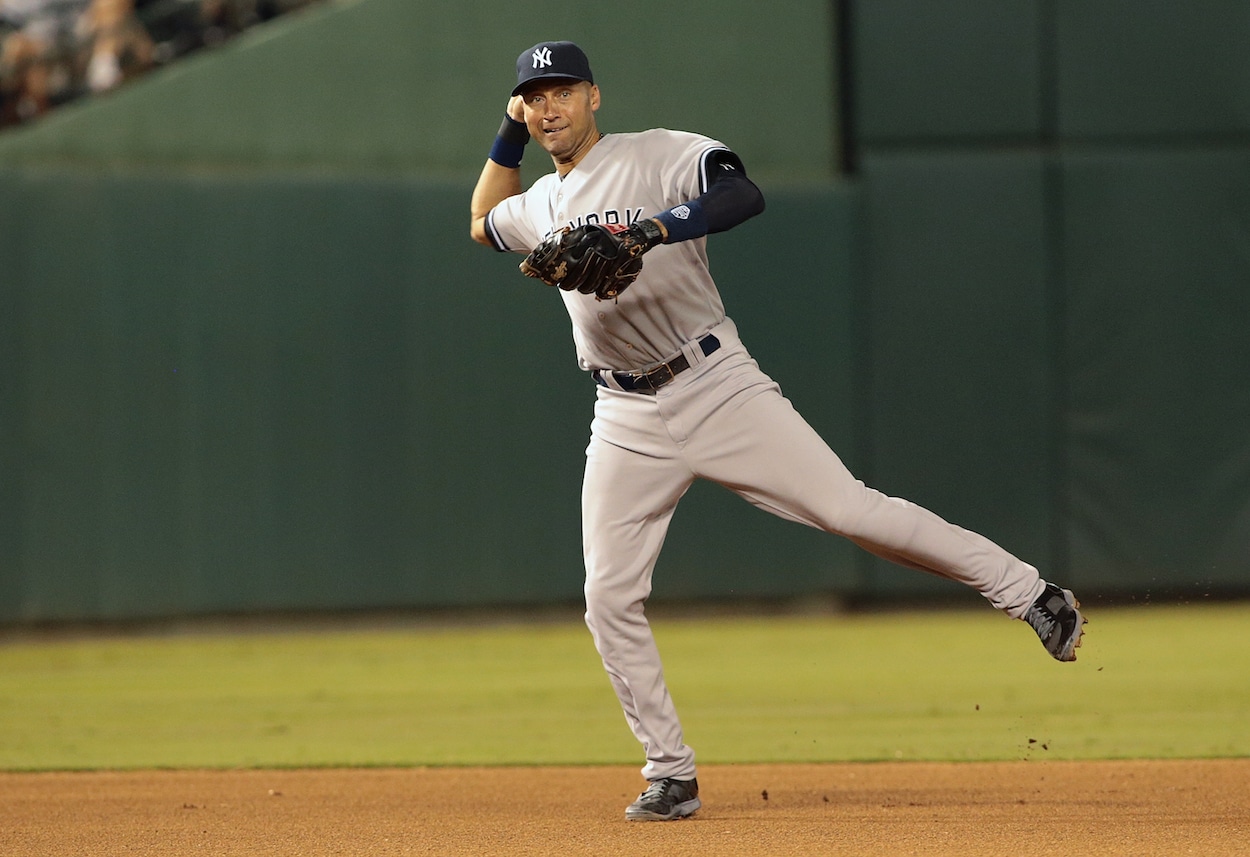
Derek Jeter’s Defense Did Him No Favors During His Hall of Fame Career, But it Didn’t Matter
Derek Jeter put together one of the most impactful MLB careers of anyone in his generation. That’s verified by the five-time World Series champion getting enshrined at the Baseball Hall of Fame in Cooperstown, New York, on the first try. The legendary shortstop appeared on 99.7% of BBWAA ballots.
He made it to Cooperstown mostly because of his offensive accomplishments, yet two of the most iconic images from his playing days came from when he was playing defense.
Anytime an infielder executes a jump-throw, the first thought many diehard baseball fans have (even if they hate the New York Yankees) is of Jeter. There’s also the image many fans remember of him catching a pop-up and landing in the stands at the old Yankee Stadium.
Those two plays have been on defensive highlight reels for the better part of the last two decades. This is ironic because when looking at some of Jeter’s advanced statistics, his defensive play at shortstop is among … the worst.
Let’s dig into that a little more before showing how he made up for it — and more — at the plate to become the first-ballot Hall of Famer he is.
Derek Jeter’s defense didn’t help him get into Cooperstown

During the 1992 MLB Draft, Derek Jeter was the first high school player off the board once the Yankees took him with the sixth overall pick. As he mentioned in his ESPN documentary, The Captain, the only thing he ever wanted to do was play shortstop for the Yankees.
But even for someone in his position, baseball has a way of humbling players in one way or another.
For The Captain himself, that happened just about immediately as a 19-year-old in the South Atlantic League. Jeter slashed a respectable .295/.376/.394 in 128 games played, but he also committed 56 errors at shortstop. This was the highest number of errors committed by one player during a single season in league history.
So, for him to go from that as a 19-year-old minor leaguer to winning five Gold Gloves (including three in a row from 2004-06) is a huge accomplishment.
But when it comes to advanced defensive metrics, a much different picture is painted for the 20-year MLB vet.
FanGraphs’ defensive runs saved (DRS) metric was especially unkind, giving him a value of -162 runs. And that was just from 2002, when DRS began to be tracked, to the end of Jeter’s career. The only two times he didn’t produce a negative number came in 2003 (zero) and 2009 (three). Jeter’s DRS value was worse than -10 on nine different occasions.
He said in the first episode of The Captain that he was proud to never man another position as an MLB player. While he certainly underwent a lot of growth from his first full pro season in Greensboro, this is usually a sticking point for many critics of Jeter.
How significant were Derek Jeter’s offensive abilities?
It’s easy to look at Derek Jeter’s cumulative offensive numbers and see how good he was with the bat in his hands. The 14-time All-Star had a career slash line of .310/.377/.440 with 260 home runs, 544 doubles 1,311 RBI, and 1,923 runs scored. He’s also part of the 3,000-hit club, with his 3,465 base hits ranking sixth all-time.
To put his work in proper perspective, I thought it’d be interesting to compare Jeter’s offensive production to three other Hall of Fame shortstops.
Fellow shortstops that come to mind for this include Cal Ripken Jr., Barry Larkin, and Ernie Banks. Among this subgroup of players, Jeter racked up the second-most games played (2,747) and plate appearances (12,602). While he was the only one to post a negative defensive rating throughout his career, he scored the most runs and nearly beat out Larkin for the most stolen bases (379 to 358).
Jeter also had the highest batting average and on-base percentage, tied with Larkin for the highest wOBA, and posted a 119 wRC+ that was the best of the bunch. Ripken’s 92.5 fWAR is the only one higher than Jeter’s (73.1), and the New York legend accomplished this without leaning on home runs a ton. Only Larkin’s 198 came in below Jeter, and the fellow Hall of Famer had about 2,500 fewer plate appearances in the process.
Don’t forget about Jeter’s postseason resume and intangibles
It’s hard to start an MLB career better than Derek Jeter did based on team accomplishments. After his first five full seasons with the Yankees, he had already won four World Series titles. And sure, he won just one more the rest of his career (in 2009), but with Jeter on the Yankees, it was nearly a certainty New York would be playing October baseball.
Throughout his 20 years in the big leagues, there were just three occasions when the league didn’t have Jeter participating in the postseason: 2008, 2013, and 2014. That’s ridiculous. And for as good as he was in the batter’s box during the regular season, the shortstop was slightly better when chasing a World Series title.
All those opportunities to play led to Jeter getting a full season’s worth of games in October throughout his career. Through 734 plate appearances, he hit .308/.374/.465 with 20 home runs, 61 RBI, 111 runs scored, and a 121 wRC+. This included winning World Series MVP honors during the 2000 Subway Series against the Mets, during which he posted a 1.344 OPS in 25 plate appearances.
The Yankees have had several captains throughout the organization’s history — 11 officially recognized, to be exact. But only one of them earned “The Captain” as a nickname. And yes, that’s Derek Jeter. Could it be because his 11-year run with that title was the longest in Yankees history? Possibly, but it’s also a testament to how much others respected him and that “intangible” impact a player has on his team.
It’d be easy to point to Jeter’s Baseball Reference page and make note that after winning the American League Rookie of the Year Award in 1996, he never took home an MVP Award. While that’s true, Jeter finished within the top 25 of voting 12 times, including eight top-10 finishes. Just eight players within the top 50 of career MVP shares failed to win the award. Jeter is included in that group as his 2.77 shares are tied with Johnny Bench (who won two MVP Awards) for 47th all-time.
Looking back on his Hall of Fame career, did Jeter’s defense do him any favors? Not really. But when accounting for everything else he accomplished under the game’s brightest lights, it didn’t matter. It shouldn’t matter, either. The full body of work justifies him nearly becoming the first unanimous selection in Hall of Fame history.
Like Sportscasting on Facebook. Follow us on Twitter @sportscasting19 and subscribe to our YouTube channel.
All stats courtesy of Baseball Reference and FanGraphs.


